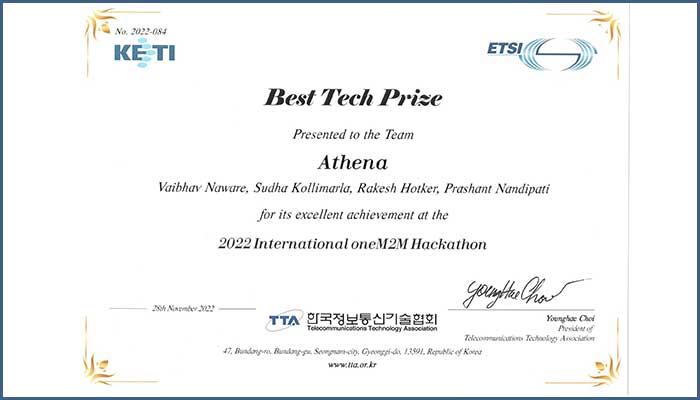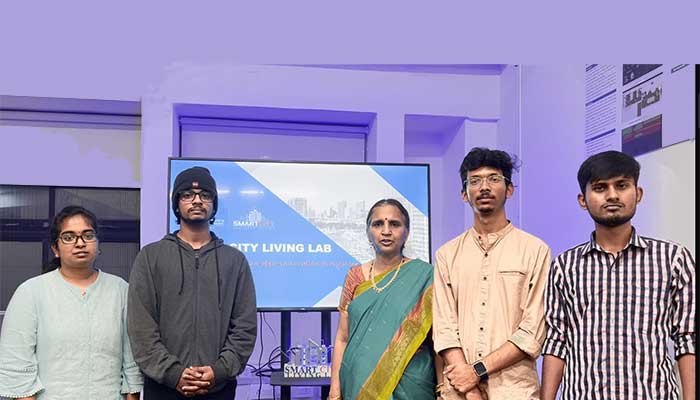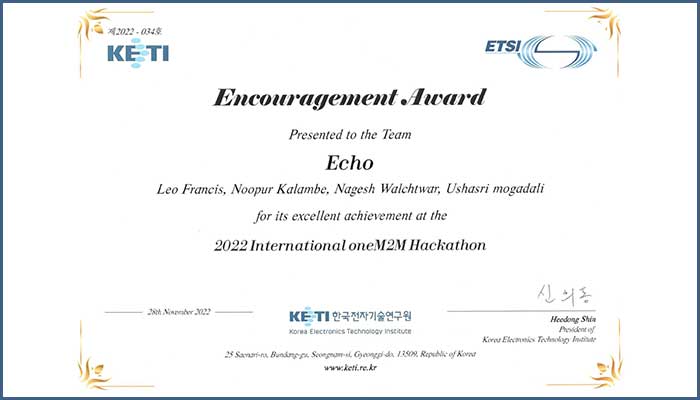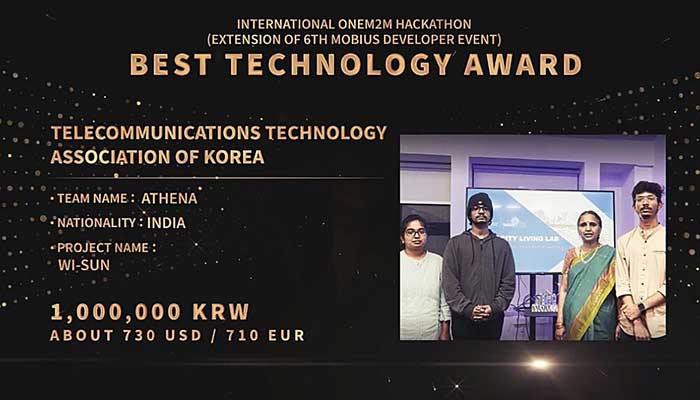The goal of the annual hackathon is to promote solutions that use one of the open source oneM2M platforms.
An 8-week-long international online hackathon hosted by the Korean Electronics Technology Institute (KETI) in association with TTA (Telecommunications Technology Association), ETSI (European Telecommunications Standards Institute), along with the Ministry of Science and ICT, South Korea saw a street light automation project from IIITH’s Smart City Living Lab walk away with the Best Technology Award in the Telecommunications category.
oneM2M Emphasis
The goal of the hackathon is to build IoT solutions that can solve societal problems with the mandate of using one of the open-source oneM2M platforms. oneM2M is the global standards initiative that was established to address serious interoperability issues arising out of various vendor-specific IoT solutions designed for specific applications. oneM2M provides a common architecture for IoT cross domain interoperability in terms of communication and semantic data.
Team Athena’s Winning Project
A total of 12 university teams participated in the hackathon with two of them representing IIITH’s Smart City Living Lab. Team Athena led by Vaibhav Naware saw Prashant Nandipati, Rakesh Hotkar and Sudha Kollimarla working on their goal of deploying smart streetlight control across cities to save the workload as well as energy usage. They demonstrated this with the help of IoT and Wi-SUN technology through oneM2M (OM2M implementation from LAAS-CNRS).

According to Anuradha Vattem, Lead Architect of the Smart City Living Lab who mentored the winning team, “The Subscription (SUB), Access Control Policy (ACP), Internetworking Proxy Entity (IPE) features of oneM2M have been extensively used for this deployment”. Vaibhav explains that Wi-SUN RF-mesh was used for the data connectivity in conjunction with a border router at the last stage to get data onto the oneM2M cloud with the help of WiFi. “With its unique feature of being a self-healing network, deployable for a wider reach that uses less infra, and suitable for low bandwidth IoT data, Wi-SUN was our preferred network in this project,” he states. The mesh network is an offering of Silicon Labs, one of the corporate funding partners of the Smart City Living Lab. The control of the lights was done based on the light intensity measured with a luminosity sensor.

Centralized Displays
The team created an attractive dashboard which can display the status of each streetlight enabling remote monitoring. The customizable dashboard also contains information on the general system status, notification engine alerts of important events, temperature, humidity, latency and other information. In addition to this, the map interface helps deep-dive into the finer details. Besides this, a live mini replica of the entire street lighting network was also created in the form of a physical dashboard. “It can help determine visually if any node has been disconnected due to lack of acknowledgement from the mesh network,” explains Ajay Mathew, a visiting faculty.
Team Echo
The other participating team from IIITH, named Team Echo led by Leo and comprising of Noopur, Ushasree and Nagesh also came up with an interesting concept. They created services that allow users to create a custom “Task Flow” to automate actions between different internet-connected devices and services. “The solution not only simplifies maintenance of existing infrastructure but also supports a very user-friendly and easy-to-use interface for creating, managing, and monitoring your IoT automation flow,” notes Anuradha. According to her, “The aim is to spread the message that one need not be technical to maintain IoT devices. Ultimately we want people to get more comfortable with smart city implementation.”

Strong Contenders
Since its inception by the Korean tech institute, teams from IIITH’s Living Lab have participated twice in the hackathon. Last year’s participating team received the Best User Application Award. “The Smart City Living Lab is considered as one of the few labs who have used oneM2M extensively for the smart city implementations. With last year’s award and this year’s Best Technology award, it only goes to show that our teams are definitely strong contenders in future hackathons,” observes Anuradha.

Sarita Chebbi is a compulsive early riser. Devourer of all news. Kettlebell enthusiast. Nit-picker of the written word especially when it’s not her own.


Next post